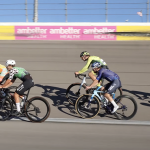A federal judge in Ohio last Monday concluded that Riddell Inc. had a duty to warn former Minnesota Vikings offensive lineman Korey Stringer that its helmets and shoulder pads could contribute to heat stroke when used in hot conditions. Stringer died nearly eight years ago from complications of heatstroke.
As a result, U.S. District Court judge John D. Holschuh ordered a Nov. 2 jury trial to determine whether Riddell's failure to warn Stringer comprises legal culpability for his death.
Regardless of that eventual outcome, Stringer family spokesman James Gould described the ruling as a “landmark” because it makes the connection between the equipment and heat stroke. Gould said the best way to uphold Stringer's legacy is to “make sure what happened to Korey doesn't happen to any other football player — from the National Football League all the way down to kids in Pop Warner.” He added, “This decision should go a long way to ensure it doesn't.”
Stringer, 27. collapsed after a training camp practice on July 31, 2001 and died the next day in Mankato, MN. Stringers body temperature was reported to be nearly 110 degrees when he arrived at the hospital.
Stringers wife Kelci settled legal claims in 2003 against the Minnesota doctor who treated him. She also settled a lawsuit earlier this year against the NFL, which agreed to support the creation of a heat illness prevention program for athletes of all ages.
Several reports suggesting Stringer may have used a supplement containing the stimulant ephedra on the morning of his death has been vehemently denied by Stringers widow. Toxicology tests conducted following Stringers death found no traces of ephedra, although caffeine was found in Stringer. Attorneys for the Vikings attest that Stringers blood was never tested specifically for ephedra, which is a stimulant that was strongly discouraged by the NFL prior to Stringers death. Ephedra is now banned in the NFL.
According to 2008 Annual Survey of Football Injury Research, there have been 120 heat stroke cases that have resulted in death between 1960 and 2008, including six in 2008. The report, which is sponsored by the American Football Coaches Association, the National Collegiate Athletic Association, and The National Federation of State High School Associations, states “There is no excuse for any number of heat stroke deaths since they are all preventable with the proper precautions ”













